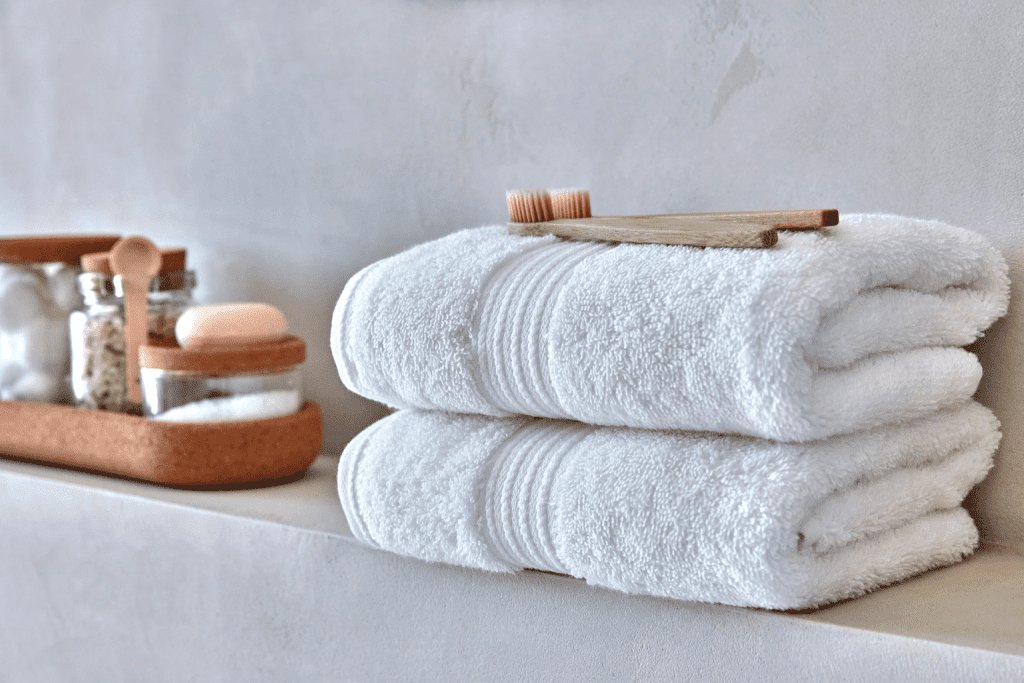Keeping towels clean may seem straightforward, but it’s actually more important than many people realize. Towels accumulate bacteria, dead skin cells, and mold, especially in high-moisture areas like bathrooms and kitchens. With advice from cleanliness expert Peter Walsh, as shared on Rachael Ray’s show, let’s explore how often you should wash your towels and the best practices to keep them fresh, hygienic, and long-lasting.

Why Towels Need Regular Cleaning
Towels are breeding grounds for bacteria, especially when they remain damp for extended periods. Whether it’s bath towels, hand towels, or dish rags, if they don’t dry completely between uses, they can develop unpleasant odors and harbor germs. In high-moisture environments, like bathrooms, towels are prone to mold and mildew, making regular washing essential to maintain hygiene.
How Often Should You Wash Bath Towels?
According to experts, bath towels should be washed every three to four uses. Given that we use bath towels after a shower, they absorb moisture and any lingering bacteria or skin cells. Leaving them damp without proper air circulation accelerates bacterial growth, which can lead to that familiar musty smell.
Quick Tips for Keeping Bath Towels Fresh:
- Hang towels to dry properly: Use a rod instead of hooks to allow towels to spread out and dry faster.
- Avoid leaving them in a pile: Piling up damp towels creates the perfect environment for mold growth.
- Choose a well-ventilated area: Bathrooms with good airflow help towels dry completely, reducing the need for frequent washes.
Hand Towels: The Most Frequently Used Towels
Hand towels are among the most frequently used linens, especially in shared spaces like bathrooms and kitchens. Experts recommend washing hand towels every two days, as they come into contact with multiple hands throughout the day. Frequent washing is crucial, especially if the towels are used by multiple people, to prevent the spread of germs.
Tips for Maintaining Clean Hand Towels:
- Switch out hand towels frequently in shared bathrooms, especially during cold and flu season.
- Keep separate towels for guests if possible, to maintain an extra level of hygiene.
Dish Towels: Keeping the Kitchen Clean and Germ-Free
Dish towels and rags are essential in the kitchen, but they are also highly susceptible to bacteria. With their constant use for wiping hands, drying dishes, and cleaning surfaces, dish towels should ideally be washed after each day of use. Damp dish towels left overnight can attract bacteria quickly, which may then spread to surfaces and utensils.

Best Practices for Dish Towels:
- Have multiple towels on hand to replace throughout the day if needed, especially when cooking meals.
- Use separate towels for drying hands and cleaning surfaces to avoid cross-contamination.
Keeping Towels in Humid Environments: A Mold Risk
Peter Walsh, an expert on household cleanliness, highlights that the issue with towels isn’t always the towel itself but rather the environment in which it’s kept. Bathrooms, especially ones with poor ventilation, create a humid environment where towels can take longer to dry, making them susceptible to mold. In such cases, washing towels more frequently is recommended, as moisture allows bacteria to multiply at a faster rate.
Tips for Humidity Control in the Bathroom:
- Run an exhaust fan during and after showers to help reduce humidity.
- Hang towels on a heated towel rack, if possible, for faster drying.
- Consider dehumidifiers in bathrooms with limited ventilation to keep moisture levels low.
How to Wash Towels for Maximum Freshness
To ensure your towels come out of the wash fresh and soft, it’s essential to follow the right washing techniques. Here are some tried-and-true methods to keep your towels in the best condition:
- Use Hot Water: Washing towels in hot water (around 140°F or 60°C) kills more bacteria than cold water.
- Avoid Overloading: Give towels enough room in the washer to allow water and detergent to penetrate the fibers properly.
- Add Vinegar for Extra Freshness: White vinegar acts as a natural deodorizer and can help remove residue from fabric softeners, which can make towels less absorbent.
- Skip the Fabric Softener: Although it may be tempting, fabric softeners leave a coating on towels, making them less absorbent over time.

How to Dry Towels Correctly
Drying towels thoroughly is just as important as washing them. Improper drying can lead to a stale, damp smell. Here’s how to make sure your towels dry properly:
- Use a High Heat Setting on the Dryer: High heat is effective at killing any lingering bacteria that may not have washed out completely.
- Shake Out Towels Before Drying: Shaking helps fluff the fibers and reduces drying time.
- Air-Dry for a Fresh Scent: Whenever possible, hang towels outside in the sun. UV rays naturally kill bacteria, and air-drying gives towels a fresh scent.
Signs That It’s Time to Replace Your Towels
Even with proper care, towels don’t last forever. Over time, they lose absorbency, start fraying, or develop a permanent odor. Here are some signs that indicate it’s time to invest in new towels:
- Loss of Softness: If your towels feel rough or scratchy even after washing, their fibers may be worn out.
- Reduced Absorbency: Towels that no longer absorb water effectively have likely lost their quality.
- Lingering Odor: If washing and drying don’t remove odors, it’s time for a replacement.
How to Store Towels for Longevity
Storing towels properly can help them last longer and maintain freshness between washes. Here’s how to keep your towels fresh in storage:
- Store in a Cool, Dry Place: Avoid damp basements or humid bathrooms, as these areas can lead to mildew.
- Avoid Overstacking: Allow space between towels to prevent any trapped moisture from developing into mold.
- Use Linen Sprays for Freshness: Lightly misting a linen spray can keep towels smelling fresh and add a pleasant scent to your linen closet.
Conclusion: Clean Towels for a Healthier Home
Regular towel cleaning is essential not just for maintaining freshness but also for ensuring a hygienic environment. Washing bath towels every three to four uses, hand towels every two days, and dish towels daily keeps bacteria and unpleasant odors at bay. By implementing these simple practices, you can enjoy the luxury of fresh, clean towels each time you reach for one. Remember, a little extra attention to towel hygiene goes a long way in keeping your home cleaner and healthier. So next time you grab a towel, you can feel confident it’s as fresh as it should be!